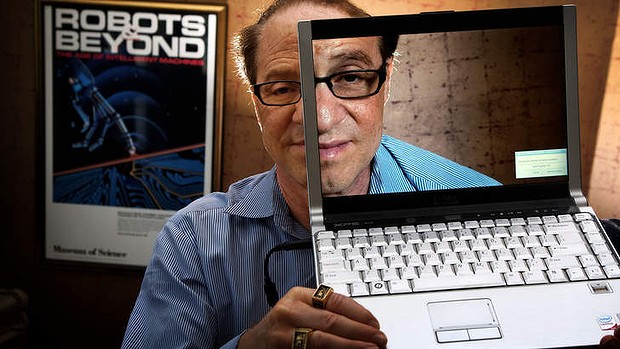The famous futurologist Raymond Kurzweil will lead the development of Google. Everyone - a body of nanobots by 2020?

A week ago ( as mentioned on the hub ), Google hired a new director of engineering, and he became the famous futurist Ray Kurzweil (Ray Kurzweil) .
This event is expected to boost Google stocks , and it’s truly intriguing, because Kurzweil is considered both brilliant and crazy: he is a pioneer in areas such as speech recognition technology, and at the same time believes that he will live forever after of how he will transfer his mind to the computer.
In his newsletter, Kurzweil said :
“In 1999, I said that in ten years, technologies like cars without a driver and mobile phones that could answer your questions will appear, but people rejected these predictions as unrealistic. After 10 years, Google demonstrated such machines, and people actually ask questions to their Android phones.
We are now in a startling, ever-accelerating process of innovation, and Google is at the forefront of this. I have always worked on creating practical systems that will change people's lives - this is what interests me as an inventor.
"I am extremely happy to join forces with Google in working on some of the most complex problems of computer science (computer science), so that the predictions for the next decade become a reality."
In one of his books, The Singularity is Near , published in 2005, the famous futurist predicted that humans would “transform biology” soon and would exist in the universe as immortal cyborgs.
Here are just a few of the most incredible quotes from there :
In 2040, people will develop “means for instantly creating new parts of themselves, biological or non-biological,” so that people can “use the biological body for a while, then not the biological, then biological again, then change it, and so on. further ”(The Singularity is Near, p. 258);
At the end of 2020, you can eat as much junk food as you like, since everyone will have nano-bots injected into their bloodstream that will provide us with the necessary trace elements, and they will remove the excess fat obtained after eating 20 packets of chips daily. (p. 304);
In 2010, “ computers ... will become virtually invisible:sewn into clothes, built into furniture and surroundings. ” Although the concept of “wearable” computers is discussed from time to time, it is still not yet visible that Samsung sells its Galaxy in the form of a jacket. (p. 312);
In an uncertain moment in the future, it will be possible to transfer oneself into the consciousness (brain) of another person, and see the world as he (a) sees it , just like in the film Being John Malkovich . (p. 316);
By 2033, “virtual prostitution” will be legalized . (p. 318);
By the mid-21st century, people are evolving into “people based on software(software-based humans) ”that will“ live on the Internet, project bodies wherever you want or want, including holographic and foggy (steam) projections of bodies, and physical bodies consisting of swarms of nanobots. ” (p. 325);
Kurzweil, now 64 years old, knows that his body is made of flesh (or, as he calls it, “Body 1.0 ″) has a great chance to die before he can load his consciousness into a computer and will fly around the world in in the form of a swarm of nanobots. Kurzweil says that in order to live up to the day when such technological opportunities become available, he takes “250 supplements (tablets)” daily and receives “6 intravenous infusions (nutritional supplements that enter the bloodstream directly bypassing the digestive tract) every week.” (p. 211)
Although for ordinary people of flesh and blood this all seems superfluous, Kurzweil is ready to pay such a price for a ghostly chance to become immortal. And if you are now grinning while reading all this - who knows, maybe he will laugh last when you wither away in the hospital, and he will fly in his program-controlled Body 2.0.
Additionally:
- TechCrunch: Ray Kurzweil Joins Google In Full-Time Engineering Director Role; Will Focus On Machine Learning, Language Processing
- Huffington Post: Google, Kurzweil, and the Information Transformation Age
- Interview: Ray Kurzweil on Translation Technology
Earlier on Habré:
- R. Kurzweil - “How to create a mind”. Book Overview
- Racing with the car: challenges and prospects of the future economy
- Fundamentals of the approach to building universal intelligence. Part 1 , Part 2
- Ray Kurzweil Transcendent Man Movie
- The birth of AI will happen in the stock market
photo: Brisbane Times
Do you think it’s worth rejoicing or not?
Do you support these areas of research?
